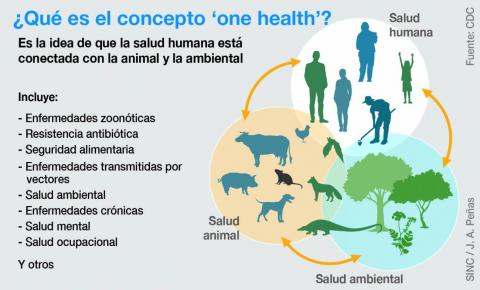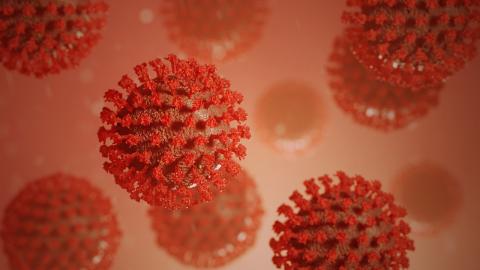Reactions to possible cases of "camel virus" (MERS-CoV) at the World Cup in Qatar
Several media outlets are reporting cases of "camel flu" or MERS-CoV at the World Cup in Qatar, including three French national team players. However, no cases have been confirmed and the news reports speak of non-specific symptoms that could be due to any other infectious condition. This coronavirus, discovered in 2012, has a high case fatality rate and before the start of the competition, the WHO had already asked fans travelling to the country to watch out for possible symptoms.

Adobe Stock.
Juan Echevarría - MERS EN
Juan Echevarría
Scientific researcher at the Reference and Research Laboratory for Immunopreventable Viral Diseases of the National Microbiology Centre - Carlos III Health Institute
Information on MERS and the procedure for dealing with suspected cases is available on the website of the Ministry of Health. Surveillance for MERS is routinely planned for travellers coming from at-risk areas with compatible symptoms and will continue to be carried out for travellers coming from Qatar for the World Cup.
The National Microbiology Centre (CNM) is the reference laboratory in Spain for MERS and is responsible for analytical determinations of all suspected cases. In recent years, several cases related to travel to endemic areas have been treated with negative results. We are not aware of any laboratory-confirmed cases of MERS among the teams participating in the World Cup in Qatar so, in the absence of this information, we assume that it is most likely to be respiratory infections caused by other more conventional viruses that are currently actively circulating in the middle of the northern hemisphere winter.
Jacob Lorenzo Morales - MERS EN
Jacob Lorenzo-Morales
Professor of Parasitology, Director of the University Institute of Tropical Diseases and Public Health of the Canary Islands of the University of La Laguna and CIBERINFEC researcher
MERS or Middle East Respiratory Syndrome is a disease caused by a coronavirus. Like most infections caused by these viruses, it is zoonotic in origin, i.e. it is transmitted from animals to humans through close contact. In the case of MERS, the virus is transmitted by contact with infected dromedaries and very sporadically human-to-human transmission has been seen. The infecting person usually shows symptoms of infection. These symptoms are mainly fever, cough, nasal congestion and respiratory distress, which can lead to pneumonia. The disease has a case fatality rate of 35%, according to WHO data. In outbreaks to date, both in the endemic area of Arabia and in events exported to other countries, such as the outbreak in South Korea in 2015, it has always been reported that the onset of transmission chains has started by direct contact with dromedaries and infected patients subsequently showed symptoms consistent with MERS.
During 2022 there have been two cases of MERS detected in Qatar, between March and April. The suspected cases at the World Cup have not, to my knowledge, been confirmed as MERS. In the case of the French national team players, it will be necessary to study whether it is true that they are infected by MERS and not by another virus, to confirm which pathogen they are suffering from and whether they have had contact with dromedaries.
In any case, we must be vigilant for possible new cases, but also raise awareness among people in the region about proper hand washing, avoid contact with camels and watch for possible symptoms compatible with MERS and, as far as possible, avoid crowds. We should be cautious and appeal to common sense. Above all, those in the region should avoid contact with camels and maintain good hand hygiene and safe distances.
Sonia Zúñiga - MERS EN
Sonia Zúñiga
Virologist at the National Biotechnology Centre (CNB-CSIC)
The coronavirus that causes MERS continues to circulate since it emerged in 2012, mainly in Middle Eastern countries, including Qatar. In this sense, and taking into account that we also have another coronavirus, SARS-CoV-2, circulating around the world, the WHO's alert to ensure that all those travelling to the World Cup were prepared for possible symptoms of the infection makes a lot of sense.
It should also be borne in mind that, at present, the transmission of MERS-CoV between people is not very efficient, unless they are very vulnerable people (immunocompromised, etc.), but transmission is more efficient from camels to humans and therefore the WHO recommended being careful with this type of risky contact.
Unfortunately, none of the cases of possible infections are being diagnosed (e.g. by PCR, which has been established for years) as to whether these infections are MERS-CoV or not, and therefore MERS-CoV ("camel virus") cannot be blamed with certainty for these cases. Such a diagnosis would have been highly desirable, as a co-infection of MERS-CoV and SARS-CoV-2 (e.g. on return to the country of origin) could cause much more severe disease, as has been determined in the few cases of co-infection with these two coronaviruses described during the pandemic.
"I am a member of the scientific advisory committee of SMC Spain".



